【人教版高三英语】选修七第二单元教案
人教版高中英语选修7教案unit2robots3
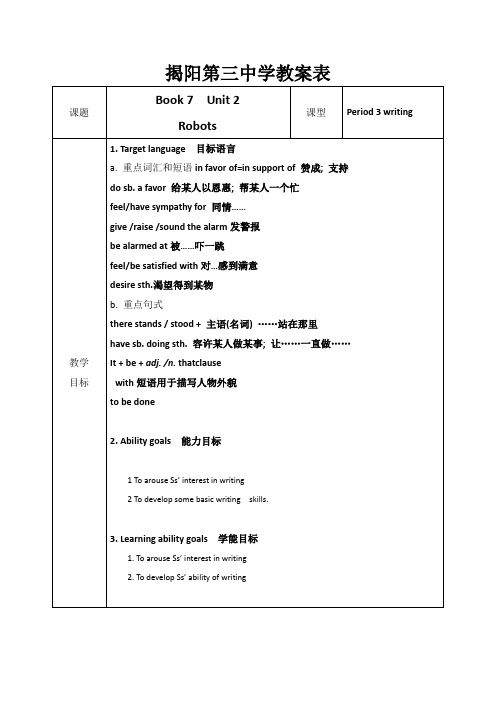
Write a story of how John invented a robot into your homework book using the sentence patterns learnt in the unit.
OPTIONAL copy step 4 for the poor level students.
揭阳第三中学教案表
课题
Book 7Unit2
Robots
课型
Period 3 writing
教学
目标
1. Target language目标语言
a.重点词汇和短语in favor of=in support of赞成;支持
do பைடு நூலகம்b. a favor给某人以恩惠;帮某人一个忙
feel/have sympathy for同情……
3.他只好抽出一些空余时间来忙于他的发明。
He has toset asidesome spare time to work on his invention.
4.在周末,他经常自己一个人呆在房间里摆弄一大堆电子物件。
On weekends, he stays alone in his room and plays witha pile ofelectronic articles.
仿写根据汉语意思完成下列英语句子。
(1). Isn’t it surprising _____ ________________________ _______(只有两人受了轻伤) in the accident?
(2). It is certain ______________ __________ (你会考试及格) if you work hard at your lessons.
人教版高中英语选修7 Unit 2 Robots教学设计
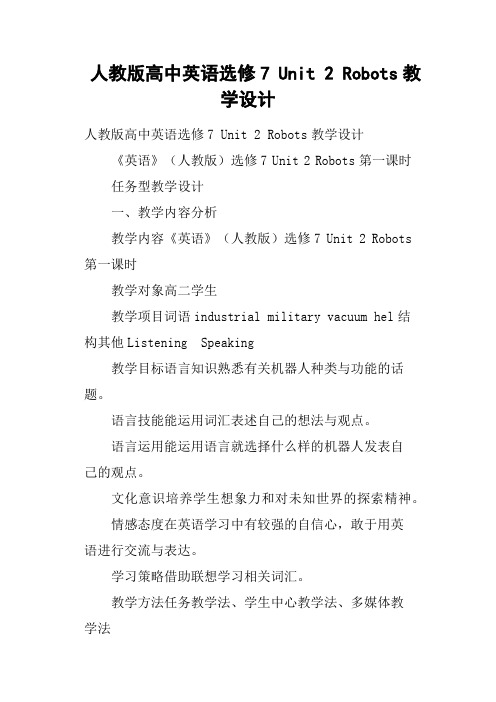
人教版高中英语选修7 Unit 2 Robots教学设计人教版高中英语选修7 Unit 2 Robots教学设计《英语》(人教版)选修7 Unit 2 Robots第一课时任务型教学设计一、教学内容分析教学内容《英语》(人教版)选修7 Unit 2 Robots 第一课时教学对象高二学生教学项目词语industrial military vacuum hel结构其他Listening Speaking教学目标语言知识熟悉有关机器人种类与功能的话题。
语言技能能运用词汇表述自己的想法与观点。
语言运用能运用语言就选择什么样的机器人发表自己的观点。
文化意识培养学生想象力和对未知世界的探索精神。
情感态度在英语学习中有较强的自信心,敢于用英语进行交流与表达。
学习策略借助联想学习相关词汇。
教学方法任务教学法、学生中心教学法、多媒体教学法教学媒体PPT幻灯媒体、黑板教学重点学习有关机器人的词汇,培养学生表达能力。
教学难点培养学生的表达及判断能力。
运用任务Task of Unit 2: The Future Robot Companyin America is holding a robot desigDesign your robot and write a design plan.Task of Period 1: Make a list of dds of robots anduand decide what kind of robots you want to design.二、课堂教学过程时间教学步骤教师活动学生活动教学目的第1-5分钟热身导入,启动教学播放有关奥特曼的动画片段:an you makea list of works wlude robots as characters? (and get prepared to tell the class about it briefly.)2. What is a robu?(A robot is a machine designed to do jobs that are usualld by humaRobots are programmed and controlled by a computer.)思考有关机器人的作品。
人教高中英语选修七:Unit+2教案.doc
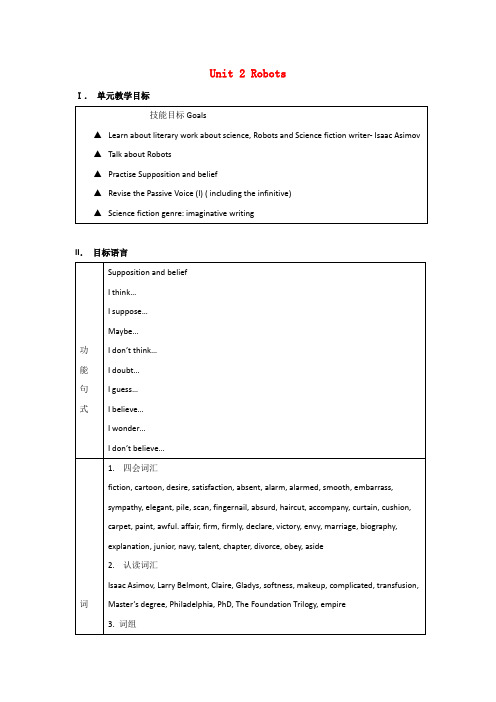
Unit 2 Robots I.单元教学目标II.目标语言III.教材分析与教材重组1.教材分析本单元以机器人和科幻小说为话题,介绍了20世纪世界知名的科幻小说家Isaac Asimov写于1951的Satisfaction Guaranteed 和作者的生平。
通过本单元的教学,旨在让学生了解科幻小说最大的特征在于,它赋予了“幻想”依靠科技在未来得以实现的极大可能,甚至有些“科学幻想”在多年以后,的确在科学上成为了现实。
如Isaac Asimov1951年描述的机器人的部分功能已经被应用于现实生活和工作中。
在教学中,要鼓励学生敢于幻想,大胆创新,发挥自己丰富的想象力和创作力,写出独具特色的科幻文章。
1.1 WARMING UP介绍了什么是机器人,和不同种类及不同形状的机器人。
1.2 PRE-READING 通过讨论机器人是否像人类一样有自己的思维,是否有感情引出IsaacAsimov的科幻小说Satisfaction Guaranteed。
为本单元的READING做好了铺垫。
1.3 READING课文是Isaac Asimov写于1951的科幻小说Satisfaction Guaranteed。
文中描述的机器人Tony是一个除去面无表情外,身材高大,相貌英俊,聪明机智的完美男人。
仅三周的时间就使女主人坠入爱河。
1.4 COMPREHENDING共有2部分,第一部分是关于课文内容的5个问答题,旨在考察学生对课文的理解。
第二部分要求学生比较机器人Tony在physical, mental, emotional 三方面与人的异同。
与PRE-READING 部分的问题相呼应。
1.5 LEARNING ABOUT LANGUAGE 分为两部分,Discovering useful words and expressions是本单元词汇练习题;Discovering useful structures是本单元语法练习题,通过本单元的学习,要求学生熟练掌握不定式的被动语态。
人教版高中英语选修7Unit2教案1
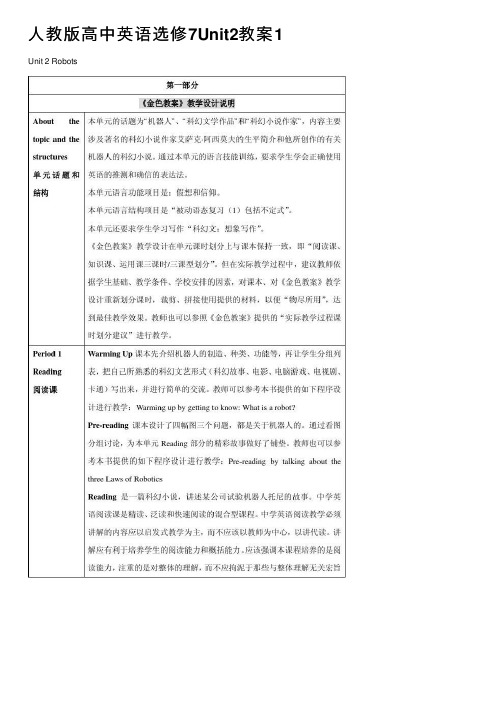
⼈教版⾼中英语选修7Unit2教案1 Unit 2 RobotsPart 1 Teaching Design第⼀部分教学设计Period 1 A sample lesson plan for reading(Satisfaction Guaranteed) IntroductionIn this period, after the warming up, students will first be guided to read for forms, copy collocations and write articles. Then they shall question and answer, read the text again to discover the leading sentence of each paragraph, and read the text for its type of writing and summary of Satisfaction Guaranteed. The class is to end by students reading a robot poem.ObjectivesTo help students understand the text’s forms and contents and learn about robotsTo help students communicate on the topic in focus with the words, collocations and structures learned in this unitFocusAidsMultimedia facilities, tape-recorder, photos, diagrams Procedures1. Warming up by getting to know w hat a robot isHello, class. When you hear the word "robot", you probably get a picture in your mind of a clever mechanical man, perhaps R2D2 or C3PO from the movie Star Wars. That is how most people think of robots, but the robots that really exist today are quite different from the robots of comic books, cartoons, and science fiction films and books.Robots come in many shape and sizes and have many different abilities. Basically, a robot is simply a computer with some sort of mechanical body designed to do a particular job. Usually, it is able to move and has one or more electronic senses. These senses are not nearly as powerful as our own senses of sight and hearing. However, scientists and engineers are working hard to improve robots. They are constantly coming up with ways to make them see, hear and respond to the environment around them.Robots have a lot to do with our lives. Now let’s go to page 11 to read an article about robot s and our lives.2. Pre-reading by talking about the three Laws of RoboticsRobots are coming into our lives. Then we are worried about being controlled by robots some day in the future. Don’t worry. We have rules for robots.3. Reading for formsRead the text Satisfaction Guaranteed again to: cut/ the sentence into thought groups, blacken the predicates, darken the connectives and underline all the useful collocations.4. Copying collocations and writing articlesA collocation is two or more words that often go together. These combinations just sound "right" to native English speakers, who use them all the time.While going over the text, try to recognize the collocations, treat them as single blocks of language and copy them out into your Collocation Book.5. Questioning and answeringNow let’s go over the text again by questioning and answering. Satisfaction GuaranteedA: What did Larry Belmont work for?B: Larry Belmont worked for a company that made robots.A: What was the company experimenting with recently?B: Recently it was experimenting with a robot that could be used todo the housework.A: By whom was it going to be tested out?B:It was going to be tested out by Larry’s wife, Claire.A:Why didn’t Claire want the robot in her house?B:Claire didn’t want the robot in her house, especially as her husbandwould be absent for three weeksA: How did Claire feel when she first saw the robot?B: When she first saw the robot, she felt alarmed.A: What was the robot like?B:The robot, called Tony, didn’t look like a machine at all. He was tall and handsome although his facial expressions never changed. His hair was smooth and black and his voice was deep.A: What did the robot do the second morning?B: On the second morning Tony brought her breakfast and then asked her whether she needed help dressing.A: How did Claire react?B:She felt embarrassed and quickly told him to go. It was disturbing and frightening that he looked so human.A: What did Claire mention one day?B:One day, Claire mentioned that she didn’t think she was clever.A: And what did Tony, the robot, say to her?B: Tony said that she must feel very unhappy to say that.A:How did Claire feel about a robot’s sympathy?B: Claire thought it was ridiculous to be offered sympathy by a robot.…6. Reading the text again to discover the topic sentence of each paragraphA well-organized paragraph supports or develops a single controlling idea, which is expressed in a sentence called the topic sentence. A topic sentence has several important functions: it substantiates or supports an essay’s thesis statement; it unifies the content of a paragraph and directs the order of the sentences; and it advises the reader of the subject to be discussed and how the paragraph will discuss it. Now read the text again to discover the leading sentence of each paragraph.7. Reading the text for its type of writing and summary of Satisfaction GuaranteedThere are words that signal a text's organizational structure. If you are struggling with how to make sense of what you're reading, you must increase your sensitivity to the particular word s.Determining the type of writing will help you determine the author’s topic (subject), purpose (why he is writing), style (how he should write) and tone (his attitude toward his subject - supportive, condeming, objective, etc.)It is important to find main ideas when reading. Main ideas help you remember important information. The main idea of a paragraph tells the topic of the paragraph. The topic tells what all or most of the sentences are about. The other sentences in the paragraph are called details. Details describe or explain the main idea. Read the text to find the main idea.Now go over the text for its type of writing and summary of Satisfaction Guaranteed.Type of writing A narrationMain idea of 1st paragraph A robot that could be used to do the housework was going to betested out by Larry’s wife, Claire.Main idea of 2nd paragraph The robot, called Tony, was tall and handsome, his hair beingsmooth and black and his voice being deep.Main idea of 3rd paragraph Tony was disturbing and frightening to Claire that he looked sohuman.Main idea of 4th paragraph Claire began to trust Tony.Main idea of 5th paragraph Claire was amazed by Tonny’s fingernails and the softness andwarmth of his skin.Main idea of 6th paragraph Claire thanked Tony, telling him that he was a ―dear’.Main idea of 7th paragraph Tony suggested that Claire invite Gladys and her friends to the house.Main idea of 8th paragraph Tony held Claire firmly in his arms and she felt the warmth of his body.Main idea of 9th paragraph Tony folded his arms around Claire, bending his face close to hers.Main idea of 10th paragraph Claire heard Cladys whispering to another woman that she had never seen anyone so handsome as Tony.Main idea of 11th paragraph The next morning a car drove up and took Tony away.Main idea of 12th paragraph Even though Tony had been so clever, he would have to be rebuilt—you cannot have women falling in love with machines.8. Closing down by reading a robot poemMy Robot Does My HomeworkMy robot does my homework.He helps me every night.The trouble is he doesn't gettoo many answers right.He'd probably do betterat homework but, you see,I built him, so he only knowsthe things he learned from me.--Kenn Nesbitt。
人教版高中英语选修七unit2课件PPT学习教案

who doesn't feel well. I won't _________(丢下她不管).
[答案] set aside;accompany;
leave her alone
2 . His
第9页/共86页
gambling day
and
night
________( 注 定 ) affect their
2.__________ n. 同情(心)
第2页/共86页
[答案] sympathy
5.__________ n. 事务 (pl.);事 情
[答案] affair 6.__________ vt. 宣布;声明;
表明;宣称
[答案] declare 7.__________ vt. 忌妒;羡慕 [答案] envy第3页/共86页 8.__________ n. 天才;才干;
人教版高中英语选修七unit2课件
会计学
1
contents 1.识记填读 2.联想填读 3.构词填读 4.语境填读 5.句式填读 6.核心词汇 7.单元语法 8.微型考场 9.名师讲第1坛页/共86页
Ⅰ.识记填读
1.__________ n. 渴望;欲望; 渴求;vt. 希望得到;想要
[答案] desire
desire that...渴望……)
第14页/共86页
[名师点悟] desire后接宾语从句、同位语从句或表语从句 时,从句中使用“should+动词原形”,should可省略。
He desires that I should go abroad for further education.= He desires me to go abroad for further education. 他希望我能出 国深造。
人教版高中英语选修7Unit2教案2

Unit 2 RobotsPart 1 Teaching Design 第一部分教学设计Period 2 A sample lesson plan for Learning about Language(Revise the passive voice including the infinitive)IntroductionIn this period students will be first helped by the teacher to discover and learn to use some useful words and collocations, and then to discover and revise the passive voice including the infinitive. The following steps of teaching may be taken: warming up by having a dictation, discovering useful words and collocations, reading more about the 22nd century, learning about the passive voice, discovering useful structures and closing down by putting on stage a text play of Satisfaction Guaranteed.ObjectivesTo help students revise the passive voiceTo help students discover and learn to use some useful words and collocationsTo help students discover and learn to use some useful structuresProcedures1. Warming up by having a dictationTo begin with, let’s take a dictation to strengthen our memory of the text.Larry Belmont worked for a company that make robot. Recently a robot that could do housework would be tested out Larry's life, Clair, for three weeks. Clair felt alarmed by the robot's humanly appearance. Before long she began to trust him. She told him that she and her home were not elegant enough for her husband and she envied the rich and powerful woman .The robot decided to protect her from being harm. He gave her a new haircut and changed her makeup and asked her to buy something to decorate her home. Before the night he was to leave Clair, they held a party. The guests were impressed by Clair and her home, especially by the handsome robot, whom they thought was her husband. Claire knew this is almost a dream and she felt very sad. However, the company was very satisfied with Tony, the robot although he needed rebuilding because it is absurd to have women falling in love with a machine.2. Discovering useful words and collocationsA collocation is two or more words that often go together. These combinations just sound "right" to native English speakers, who use them all the time.While going over the text, try to recognize the collocations, treat them as single blocks of language and copy them out into your Collocation Book.Now go to page 13. Work in pairs to finish the three exercises in 10 minutes.3. Learning about the passive voiceACTIVE AND PASSIVE TENSES CHARTSIMPLE PRESENT and SIMPLE PASTThe active object becomes the passive subject.am/is/are +past participlewas/were + past participleActive: Simple PresentThe movie fascinates me.The movie bores Jack.The movie surprises them.Passive: Simple PresentI am fascinated by the movie.Jack is bored by the movie.They are surprised by the movie.Active: Simple PastThe movie bored me.The movie fascinated Jack.The movie surprised them.Passive: Simple PastI was bored by the movie.Jack was fascinated by the movie.They were surprised by the movie.PRESENT and PAST CONTINUOUS (PROGRESSIVE) Passive form:am/is/are + being + past participlewas/were + being + past participleActive: Present ContinuousI am helping Shannon.June is helping Su and Ling.Passive: Present ContinuousShannon is being helped by me.Su and Ling are being helped by June.Active: Past ContinuousI was cleaning the bathroom.They were cleaning the bedroom.Susan was cleaning the kitchen and patio.Passive: Past ContinuousThe bathroom was being cleaned by me.The bedroom was being cleaned by them.The kitchen and patio were being cleaned by Susan.PRESENT PERFECT, PAST PERFECT and FUTURE PERFECT Passive form:have/has been + past participlehad been + past participleActive: Present PerfectI have mailed the gift.Jack has mailed the gifts.Passive: Present PerfectThe gift has been mailed by me.The gifts have been mailed by Jack.Active: Past PerfectSteven Spielberg had directed the movie.Penny Marshall had directed those movies.Passive: Past PerfectThe movie had been directed by Steven Spielberg. The movies had been directed by Penny Marshall.Active: Future PerfectJohn will have finished the project next month.They will have finished the projects before then.Passive: Future PerfectThe project will have been finished by next month. The projects will have been finished before then.FUTURE TENSESPassive forms: will + be + past participleis/are going to be + past participleActive: Future with WILLI will mail the gift.Jack will mail the gifts.Passive: Future with WILLThe gift will be mailed by me.The gifts will be mailed by Jack.Active: Future with GOING TOI am going to make the cake.Sue is going to make two cakes.Passive: Future with GOING TOThe cake is going to be made by me.Two cakes are going to be made by Sue.PRESENT / FUTURE MODALSThe passive form follows this pattern:modal + be + past participleActive: WILL / WON'T (WILL NOT)Sharon will invite Tom to the party.Sharon won't invite Jeff to the party. (Sharon will not invite Jeff to the party.)Passive: WILL / WON'T (WILL NOT)Tom will be invited to the party by Sharon. Jeff won't be invited to the party by Sharon. (Jeff will not be invited to the party by Sharon.)Active: CAN / CAN'T (CAN NOT)Mai can foretell the future.Terry can't foretell the future.(Terry can not foretell the future.)Passive: CAN / CAN'T (CAN NOT)The future can be foretold by Mai.The future can't be foretold by Terry.(The future can not be foretold by Terry.)Active: MAY / MAY NOTHer company may give Katya a new office. The lazy students may not do the homework.MIGHT / MIGHT NOTHer company might give Katya a new office.The lazy students might not do the homework.Passive: MAY / MAY NOTKatya may be given a new office by her company.The homework may not be done by the lazy students. MIGHT / MIGHT NOTKatya might be given a new office by her company. The homework might not be done by the lazy students.Active: SHOULD / SHOULDN'TStudents should memorize English verbs.Children shouldn't smoke cigarettes.Passive: SHOULD / SHOULDN'TEnglish verbs should be memorized by students. Cigarettes shouldn't be smoked by children.Active: OUGHT TOStudents ought to learn English verbs.(negative ought to is rarely used)Passive: OUGHT TOEnglish verbs ought to be memorized by students.Active: HAD BETTER / HAD BETTER NOTStudents had better practice English every day. Children had better not drink whiskey.Passive: HAD BETTER / HAD BETTER NOTEnglish had better be practiced every day by students. Whiskey had better not be drunk by children.Active: MUST / MUST NOTTourists must apply for a passport to travel abroad. Customers must not use that door.Passive: MUST / MUST NOTA passport to travel abroad must be applied for.That door must not be used by customers.Active: HAS TO / HAVE TOShe has to practice English every day.Sara and Miho have to wash the dishes every day. DOESN'T HAVE TO/ DON'T HAVE TOMaria doesn't have to clean her bedroom every day.The children don't have to clean their bedrooms every day.Passive: HAS TO / HAVE TOEnglish has to be practiced every day.The dishes have to be washed by them every day. DOESN'T HAVE TO/ DON'T HAVE TOHer bedroom doesn't have to be cleaned every day. Their bedrooms don't have to be cleaned every day.Active: BE SUPPOSED TOI am supposed to type the composition.I am not supposed to copy the stories in the book.Janet is supposed to clean the living room.She isn't supposed to eat candy and gum.They are supposed to make dinner for the family.They aren't supposed to make dessert.Passive: BE SUPPOSED TOThe composition is supposed to be typed by me.The stories in the book are not supposed to be copied. The living room is supposed to be cleaned by Janet. Candy and gum aren't supposed to be eaten by her. Dinner for the family is supposed to be made by them. Dessert isn't supposed to be made by them.PAST MODALSThe past passive form follows this pattern:modal + have been + past participleActive: SHOULD HAVE / SHOULDN'T HAVEThe students should have learned the verbs.The children shouldn't have broken the window.Passive: SHOULD HAVE / SHOULDN'T HAVEThe verbs should have been learned by the students. The window shouldn't have been broken by the children.Active: OUGHT TOStudents ought to have learned the verbs. (negative ought to is rarely used)Passive: OUGHT TOThe verbs ought to have been learned by the students.Active: BE SUPPOSED TO (past time)I was supposed to type the composition.I wasn't supposed to copy the story in the book.Janet was supposed to clean the living room.She wasn't supposed to eat candy and gum.Frank and Jane were supposed to make dinner.They weren't supposed to make dessert.Passive: BE SUPPOSED TO (past time)The composition was supposed to be typed by me. The story in the book wasn't supposed to be copied. The living room was supposed to be cleaned by Janet. Candy and gum weren't supposed to be eaten by her. Dinner was supposed to be made by them.Dessert wasn't supposed to be made by them.Active: MAY / MAY NOTThat firm may have offered Katya a new job.The students may not have written the paper.MIGHT / MIGHT NOTThat firm might have offered Katya a new job.The students might not have written the paper.Passive: MAY / MAY NOTKatya may have been offered a new job by that firm. The paper may not have been written by the students. MIGHT / MIGHT NOTKatya might have been offered a new job by that firm.The paper might not have been written by the students.4. 被动语态小结●被动语态的特殊结构形式1)带情态动词的被动结构。
人教版英语选修7教案 Unit 2
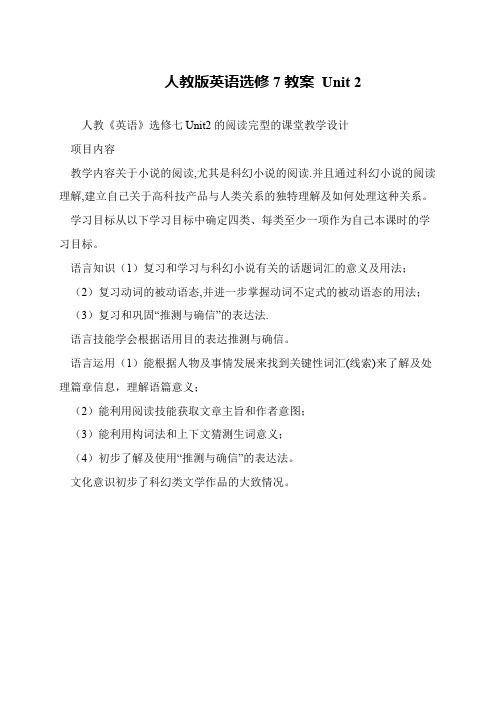
人教版英语选修7教案Unit 2
人教《英语》选修七Unit2的阅读完型的课堂教学设计
项目内容
教学内容关于小说的阅读,尤其是科幻小说的阅读.并且通过科幻小说的阅读理解,建立自己关于高科技产品与人类关系的独特理解及如何处理这种关系。
学习目标从以下学习目标中确定四类、每类至少一项作为自己本课时的学习目标。
语言知识(1)复习和学习与科幻小说有关的话题词汇的意义及用法;
(2)复习动词的被动语态,并进一步掌握动词不定式的被动语态的用法; (3)复习和巩固“推测与确信”的表达法.
语言技能学会根据语用目的表达推测与确信。
语言运用(1)能根据人物及事情发展来找到关键性词汇(线索)来了解及处理篇章信息,理解语篇意义;
(2)能利用阅读技能获取文章主旨和作者意图;
(3)能利用构词法和上下文猜测生词意义;
(4)初步了解及使用“推测与确信”的表达法。
文化意识初步了科幻类文学作品的大致情况。
人教版高中英语选修7《Unit2Robots》教案
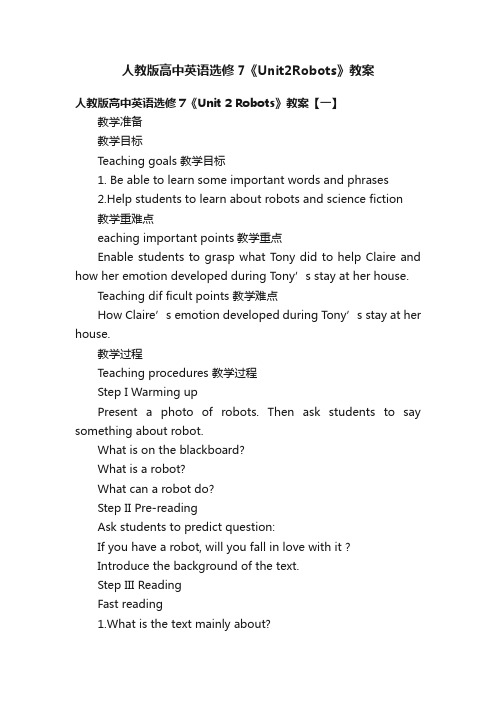
人教版高中英语选修7《Unit2Robots》教案人教版高中英语选修7《Unit 2 Robots》教案【一】教学准备教学目标Teaching goals 教学目标1. Be able to learn some important words and phrases2.Help students to learn about robots and science fiction教学重难点eaching important points教学重点Enable students to grasp what T ony did to help Claire and how her emotion developed during Tony’s stay at her house.Teaching dif ficult points 教学难点How Claire’s emotion developed during Tony’s stay at her house.教学过程Teaching procedures 教学过程Step I Warming upPresent a photo of robots. Then ask students to say something about robot.What is on the blackboard?What is a robot?What can a robot do?Step II Pre-readingAsk students to predict question:If you have a robot, will you fall in love with it ?Introduce the background of the text.Step III ReadingFast reading1.What is the text mainly about?It is mainly about how a household _________ was _________ ________ in a family.2.Find the characters in the storyLarry Belmont: working in a company that makes robotsClaire: Larry’s wife, a housewifeTony: the robotGladys Claffern: a woman that Claire envies3. Tell stu dents that Claire’s feelings towards Tony changed as the story developed. Read the story again and then fill in the blanks.Comprehensio nRead the sto ry again and find out Claire’s sense of failure and what helps did Tony offer to her.SummaryFill in the blanks according to the knowledge that we have learnt in this class.The company for which Larry worked was to have a newly?made robot____(call)Tony experimented with by his wife Claire at home. At _____first sight of Tony, Claire felt ________(alarm). She thought it was absurd tha t a robot seemed more like a human than a ______ .For as long as three weeks, Tony wanted to help her to dress, which made Claire ________(embarrass) and she refused him. But she was glad that Ton y could make her home ________, give her a new h aircut and change her makeup. To improve her home,he could also ________ a list of items for her to buy. And finally Tony helped Claire win the victory to be ________ (envy)by those ladies like Gladys Claffern who Claire wanted to be like. ________made us unbelievable was that Claire fell in love ______Tony—a robot !课后习题Homework1. Surf the Internet to get more information about science fiction..2. Preview the language points in the text.人教版高中英语选修7《Unit 2 Robots》教案【二】教学准备教学目标教学目标1. 语言知识: 使学生理解文章中表达情感变化词汇;熟悉有关机器人方面的话题。
- 1、下载文档前请自行甄别文档内容的完整性,平台不提供额外的编辑、内容补充、找答案等附加服务。
- 2、"仅部分预览"的文档,不可在线预览部分如存在完整性等问题,可反馈申请退款(可完整预览的文档不适用该条件!)。
- 3、如文档侵犯您的权益,请联系客服反馈,我们会尽快为您处理(人工客服工作时间:9:00-18:30)。
教学过程一、课程导入二、复习预习复习上节课主要内容三、知识讲解知识点1:词语辨析【考查点】词形变化1. n.满意v.使满意.令人满足的.感到满意的2. .感到惊吓的n.警报. 恐吓, 警告3 v.断言,宣称n.宣布,宣言,声明【练习】根据句子结构,用括号内所提供词的适当形式填空1) a . .()2) I a . I .()3) , .()4) . . ()5) .():1. ; 2. ; ; 3. ; ; 4. ; 5. ;知识点2:词语辨析1).【解释】属正式用语, 可代替和, 强调“主观愿望的热切性”, 含有“强烈希望做某事”的意思,语气比弱, 一般用于“难以实现或不可能实现的愿望”,指“希望”、“愿”、“想”表示实现的可能性较大的希望侧重“期待,预期,指望”多用于口语式普通场合, 指“想”、“要”或“需要”, 表示“偏爱、选择”或“需要、热爱”表“希望,渴望”【练习】选择或并用其适当的形式填空1) I I a .2) I a .3) .4) I .5) , I6) , .: 1) 2) 3) 4) 5) 6)2).【解释】. 估定, 评定。
n. 通路, 访问, 入门【练习】选择或,并用其适当的形式填空1) .2) a ;: 1) 2)3)【解释】指“在战争、竞赛、斗争中获胜”, 并有“击败对方或敌人”的含义对预期的、计划的、尝试的事物的目标达到指“征服某国或某民族, 从而使之处于被支配地位的胜利或战胜”指“辉煌或彻底的胜利或成功”【练习】选择或并用其适当的形式填空1) a .2)3) , .4) a .: 1) 2) 3) 4)知识点3:重点词汇1. n.渴望.想要[重点用法].渴望得到某物.希望/渴望做某事.() 要求……a .渴望得到某物/希望做某事’s 照某人的希望[典例]1) .我们都希望幸福健康。
2) a , .每个人都渴望成功,但并非人人都渴望金钱。
3) .他要求你马上去见他。
.[练习] 汉译英1) 他想受到大学教育。
2) 他们要我快点回来。
3) 我请他立即回信。
4) 她要你立即见她。
5) 她应邀演奏了一曲。
: 1) a . 2) . 3) I . 4) () . 5) a ’ .n.满意[重点用法]n. 满意的,v. 满足, 使满意,要求赔偿;... 对感到满意对...感到满意.'s ( .)达到使某人满意的程度满意地[典例]1) , .最终,全班都对他们的工作感到满意。
2) .他的许诺并未能使他的家人满意。
[练习] 汉译英1) 买到想要的东西,她满意地离开了超市。
2) 他的试验结果似乎令人满意。
3) 这些条件中你至少要符合一项,否则就不能成为本俱乐部的会员。
: 1) , . 2) . 3) ’t , ’t a .n.警报.使```惊恐[重点用法]发警报敲警钟发警报; 吹警报号() 对...感到吃惊; 因...而惊恐... 被...吓一跳[典例]1) . 森林失火使我们大为惊慌。
2) , . 看见火灾爆发,他鸣响了警报。
[练习] 汉译英1) 看到孩子们在返校时遭遇车祸的消息,家长们感到很害怕。
2)看到大火,社区的居民发出警报。
: 1) a . 2) .4. n.同情[重点用法]同情某人同情; 赞成; 和...一致对...不同情; 不赞成; 对...没有同感, 和...不一致博得...的同情[典例]1) .出于同情,他给了这个穷孩子一点钱。
2) . 他与他们的信仰一致.[练习] 汉译英1) 听完这个故事,他对她目前的情况深感同情。
2) 通过描述他悲惨的童年,他赢得路人的同情。
: 1) , . 2) .5. .陪伴[重点用法]. a 陪伴某人去某地. . 与…同时存在[典例]1) ’s .他陪他的老父亲去医院查看胃部出了什么问题。
2) .这个季节,雷鸣常常伴有大雨。
[练习] 汉译英1) 总统出现了被六个健壮的保镖护随着。
2) 回到家乡,他的老同学们陪着他参观了这个城市。
: 1) . 2) , ..宣布[重点用法].宣布……. ( ) .宣布……为……对…宣战…声明反对/赞成[典例]1) 't . 她宣称她再也不愿见到他。
2) .很快他们就会宣布他为房子的主人。
3) a .政府通过法律宣布捕捉贩卖这种动物是非法的。
[练习] 汉译英1) 那个女明星最近宣称要嫁给一个富人然后退出舞台。
2) 公司宣布老板的儿子依法成为公司继承人。
: 1) a . 2) ..嫉妒[重点用法]. .妒忌/羡慕某人某物.成为令人嫉妒/羡慕的事物’s 羡慕某人的成功出于嫉妒/羡慕[典例]1) () .所有的同事都羡慕她的晋升。
2) .他在音乐方面的天分让其他人对手感到羡慕。
[练习] 汉译英1) 他们的新房子受到邻居的羡慕。
2) 出于妒忌,他作了伪证: 1) . 2) .知识点4:重点词组考验;试验[典例]1) .这个型号经过试验后才进行大批量生产。
2) , .上课前,这个教授习惯先将整个实验试验一番。
[短语归纳].在……(身上)做实验/试验a 参加……考试[练习] 汉译英1) 成千上万的人们将参加这周日的公务员考试。
2) 那个咨询顾问习惯先将新的政策在他自己的公司里进行实验。
: 1) . 2) .打电话给……[短语归纳]回电话挂断电话;停止讲话a 唤醒经常是模糊的记忆开始:开始一场演出,一个事件或一次行动[典例]1) I .我朋友在等我,我得挂电话了。
2) , .一到达机场,他就打电话给他母亲报平安。
[练习] 汉译英1) 今早他刚起床就有人给他打电话了。
2) 见到老板进来,他赶紧挂断电话假装在工作。
: 1) , . 2) , .转向[典例]1) a , .他听到声音,但转身却没发现有人。
2) , .当他朝旅馆走去时,突然转身发现一个老妇人跟着他。
[短语归纳]把(脸)转过去背叛,反抗打开/关掉出现/调大(音量)拒绝,调小(音量)结果是;证明是;[练习] 汉译英1) 那年轻的女士无法想象要是她的丈夫背叛她的话会是怎么样。
2) 虽然贫穷,但是女孩毅然地拒绝了别人的帮助。
: 1) . 2) , ’ .…不打扰[短语归纳]留下,遗留(把某事)搁置一边出发前往省去,遗漏,不考虑[典例]1) . 别打扰他,他会写出来的。
2) 24 .他被要求24小时内离开到另一个城市去。
3) .老师让我们将论文中不必要的词语省去。
4) ’t ; .你不该将留在山上,因为那非常危险。
[练习] 汉译英1) 老板捐款潜逃了,只留下一间空厂房。
2) 听到警报,警察丢下家人冲出去看发生了什么事。
: 1) . 2) , .将……放在一边;节省或保留(时间,金钱)[短语归纳]写下,记下开始动身( a )创立,建立,搭起出发,着手做某事(.)着手做,开始做……[典例]1) ?你可以腾出点时间听听我的想法吗?2) a .这个部门的成员放下手头的事情,全力以赴一项更紧急的任务.[练习] 汉译英1) 父亲放下报纸点了一支烟。
2) 他努力工作省下钱给他儿子上大学。
: 1) a . 2) .6. 一定做……[典例]1) . ' .我们错过了那趟车,我们肯定要迟到了。
2) 's .她注定会成为市长。
[练习] 汉译英1)他那么用功,一定会成功的。
2)这项新发现对于人类必定大有用处。
: 1) , . 2) ..知识点5:重点句子1. ’t , , ’t .克莱尔并不想把机器人留在家里,特别是在她丈夫离加三周的这个期间。
但是,克莱尔被拉里说服了。
他说,机器人不会伤害她,也不会让别人来伤害她。
[解释] :动词不定式的被动语态。
[典例]1) .所有的这些礼物必须及时邮寄,以便在圣诞节及时收到。
2) ’.吉姆最后是否适合演出仍将拭目以待。
[练习] 汉译英1) 小汤姆假装被射中了哭喊着要糖吃。
2) 此药得一日三次,饭后服用。
: 1) a . 2) a .2. , .当他转过身时,(她发现)站在那儿。
[解释] 倒装句。
在谓语为动词, , , , 等表示位置转移的动词及动词的句子中,为了强调句子中一些副词, , , , , , 等,可将副词置于句首,若这时主语是名词,句子用全倒装;若是代词,则不用倒装。
[典例]1) .老师和她的学生们来了。
2) .男孩们冲了出去。
[练习] 汉译英1) 年轻的母亲抱着手里两个月大的婴儿跑开了。
2) 走进来了生气的老板和他的秘书。
: 1) a . 2) .3. 1939.1939年,阿西莫夫开始在科幻杂志上发表文章。
[解释]. 表示“请某人做某事”,或“遭遇到某事”(宾语与宾补为被动关系). 让某人做……. 让……不停地做……[典例]1) a .我们请了个过路人给我们照相。
2) . ’s a .小心点,在这样的人群中容易被偷。
3) . ’s .教练让我们整天做同样的事情,真乏味4) , I’.既然你以前没去过,那我找人带你去。
[练习] 汉译英1) 与对手角逐时,他大腿受伤了不得不放弃比赛。
2) 残忍的老板让他的工人们整天工作。
3) 班主任让班长他不在时管理班级。
: 1) , . 2) . 3) .四、例题精析【例题1】根据课文内容完成下面语法填空,注意单词拼写和词语用法:A 1 a . a , 2 () a .a 3 (陪伴). ’t , 4 . , . 5 (渐渐地), ’s . 6 , a , .7 8 . 9 , ’s a10 .【答案】1. 2. 3. 4. 5. 6. 7.8. 9. 10.【解析】考查句意理解【例题2】阅读课文,试着用30来个单词概括课文大意或翻译下面短文。
在家接受测试的机器人能帮上她很多忙。
渐渐地爱上了他因为他是如此完美的一个人。
这使得这个机器人不得不再重新组装。
【答案】, a ’s a . a , .【解析】考查句意理解五、课堂运用【基础】1.【原句】 a .他虽然面部表情毫无变化,但是个子高大、相貌英俊,头发平整,声音低沉浑厚。
[模仿要点] 描写人物时使用多种修饰语【模仿1】她是个善良可爱的小姑娘园园的脸,大大的眼睛,雪白的牙齿,留着波浪般的长发【答案】: a , a , , .【模仿2】他是个长相很滑稽的男人,长长的胡须而没有头发【答案】: a , a .【巩固】1【原句】't . 还有对于像拉里这样很想提高社会地位的人来说,她的家也不够高雅。
[模仿要点] A + B 从句【模仿1】对于像他的班长那样想考入名牌大学的人来说,觉得自己还不够勤奋。
【答案】:’t a 2 .【模仿2】对于像他的哥哥那样想成为一名大作家的人来说,觉得自己还不够聪明。
【答案】: a .2.【原句】480 , , . 艾萨克•阿西莫夫是美国的科学家兼作家,他写过480本书,包括怪诞小说,科学和历史方面的书,甚至还写过有关«圣经»和莎士比亚的书。
